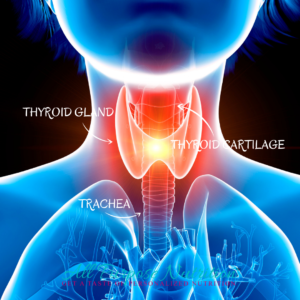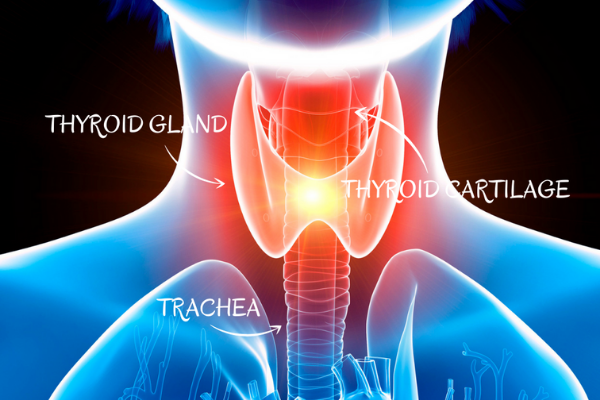The Thyroid is a complex and incredibly vital organ in the body. Unfortunately, there is a cluster of misinformation and confusion about what it is, how it works, or what it means to have an autoimmune condition like Hashimoto’s disease. For this reason, consider this content a readily available Thyroid-for-Dummies. Researchers write books on the complexity of the Thyroid, but I have created a simple summary addressing need-to-know details. I’ll be explaining what the Thyroid is, what it does and what it means when the Thyroid is not properly functioning.
What exactly is our Thyroid?

Our thyroid is a butterfly-shaped gland that sits low in the neck, below Adam’s apple, and along the front of the windpipe. Due to the Thyroid’s production of hormones, it is medically considered a “gland.” The Thyroid produces thyroxine (T4) as the primary hormone and small amounts of triiodothyronine (T3). These hormones are secreted throughout the blood and circulate the body to various tissues. A percentage of T4 then converts into T3. Triiodothyronine affects every psychological process in the body, affirming that it is an active thyroid hormone.
What do thyroid hormones do?
The majority of us are familiar with the various hormones in the body, such as estrogen (female sex hormone), testosterone (male sex hormone), and cortisol (stress hormone). But what does thyroid hormone do? The answer is just about everything.
The thyroid hormone is responsible for setting our metabolic rate, meaning it affects everything from our blood pressure and heart rate to our metabolism, body temperature, menstrual regularity, digestion, and more. Because of the thyroids significant job, it explains why thyroid dysfunction can cause such a vast array of symptoms such as:
- Weight gain or weight loss
- Increased or decreased appetite
- Feeling too hot or too cold
- Excessive sweating
- Constipation or diarrhea
- Indigestion
- Anxiety and depression
- Dry skin, brittle hair, and weak nails
- Insomnia and/or excessive fatigue
- Menstrual irregularities, infertility, and more
If you suspect you have an autoimmune thyroid disease Hashimoto’s thyroiditis, then you should read THIS blog.
This list explains why I am so enthusiastic about optimizing my clients’ thyroid function. It influences every system and organ in the body and is thus essential to feeling healthy and vibrant! To guarantee optimal digestion, high energy levels, gorgeous hair, restful sleep, menstrual regularity, healthy moods, and more, it is pertinent that our Thyroid be functioning correctly. If any of these symptoms sound familiar, I highly recommend scheduling an appointment with your doctor or naturopath to double-check your thyroid function and investigate any other issues that may be giving you trouble.
References:
How does the thyroid gland work? 2010 Nov 17 [Updated 2018 Apr 19]. Available from: https://www.ncbi.nlm.nih.gov/books/NBK279388/
